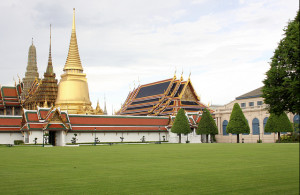In our last post, we looked at the case of the ten foreign tourists who climbed Mount Kinabalu in Sabah, Malaysia, on the island of Borneo, and angered the locals by stripping naked when they reached the summit. One of them posted photos to his Facebook page.
The local people believe that the mountain spirits caused a fatal earthquake a few days later to show their displeasure with the act.
Four of the ten were caught, jailed for three days, paid U.S. $1,300 fines and were deported back to their home countries.
I argued that as guests in other countries, foreign tourists should respect local customs (as long as they aren’t destructive) no matter how superstitious, backward, or unnecessarily draconian they may seem to visitors.
Just Youthful High Jinks?
Some other writers have argued that the case was overblown and should be written off as youthful high jinks. Who was harmed by the nudity, since they were mostly alone at the time?
The problem is that the act was offensive to the local people who consider the mountain sacred. And the instigator of the stripping, a Canadian blogger named Emil Kaminsky, deliberately provoked them by posting the photos and then labeling anyone who disagreed with him “stupid” and “an idiot.”
Kaminsky has pulled these stunts at other locations and, on his website, gloats about flaunting any cultural traditions that he disdains. He apparently left the country before getting caught and left the four who didn’t holding the bag.
Consequences Can Be Severe
But those who agree with Kaminsky that “backward” traditions should be challenged may want to consider the possible consequences.
I doubt that the Kinabalu Four were very happy about being jailed, fined, deported, and written about sensationally in the international press.
Here are some other local strictures around the world that might just ruin your trip:
* In Dubai, currently a trendy place to visit, tourists have been jailed for holding hands and kissing in public. Drinking alcohol outside a hotel is also prohibited.
* In Thailand, publicly insulting the King is a criminal offense with possible penalties of up to five years in prison.
* In Singapore, you can face a heavy fine (or occasional imprisonment) for littering, smoking in public, or spitting.
* In a number of countries around the world, you may face serious prison time (or lashes) for first offense drinking and driving.
Do Some Research Before You Go

You’ll have a warm welcome in Thailand as long as you don’t insult the King. Photo by wongaboo on Flickr.
As world travelers, each of us has a responsibility to familiarize ourselves with local customs and laws that might severely impact our visits to other lands.
Read the world travel advisories issued by your governments — whether it be the United States, Britain, Canada or wherever you live.
While I often find official travel warnings to be overly cautious, they do pinpoint specific offenses that their citizens have unwittingly (or otherwise) committed and been arrested for. Those would be good things to avoid.
Guidebooks and online information can also be very helpful. For instance, if you’re planning to travel to Dubai, google “Tourists arrested in Dubai” and see what comes up. You’ll soon know what not to do.
The same applies to any other country you visit.
Keep Traveling But Know the Rules
None of this is meant to discourage travel abroad or raise a panic alarm. Relatively few tourists ever get arrested for these types of offenses and if they do, they are often let off with a small fine or a warning. Sometimes they have to delete their pictures.
But just like you wouldn’t want to leave your wallet or purse unguarded in a crowded subway train, you should guard yourself against possible legal problems abroad. And as citizens of another country, you can’t count on your own consulates or embassies to bail you out. In many cases, you’re virtually on your own.
Simple Politeness Goes a Long Way
Some cultural offenses aren’t criminal but they are cringe-worthy, and put all tourists in a bad light.
I’ve heard plenty of Americans loudly denigrating local currencies as “funny money” or asking store clerks, “What is that in real money?” Or making fun of other languages and getting annoyed when others don’t speak English.
Learning a few simple words like “please,” “thank you,” and “hello” in other languages can go a long way toward having a more pleasant rather than contentious travel experience.
My advice: If you feel the need to criticize, keep it to yourself until you can find a private place to do or say whatever you want. Especially watch what you post to social media.
Respecting local customs may well help you make friends — not enemies — when traveling abroad.
It might even keep you out of jail.
Related story: When Traveling, Respect Other Cultures.
Readers: You can subscribe to my blog and get notification of every post by simply typing in your email address and clicking on the blue Subscribe button or downloading my free report, How to Ride the Coming Wave of Boomers. Thanks!















Leave a Reply